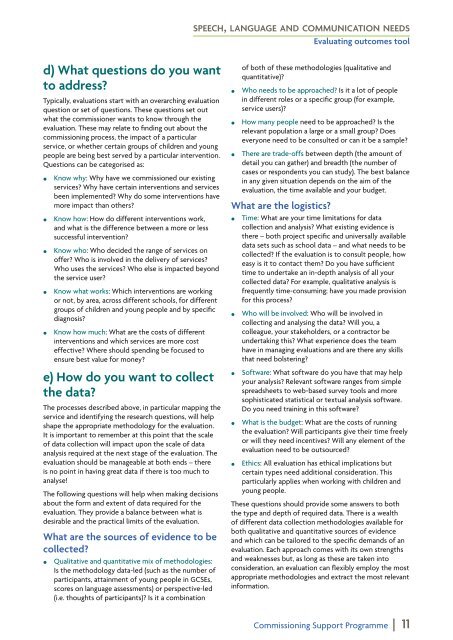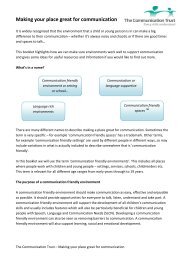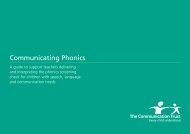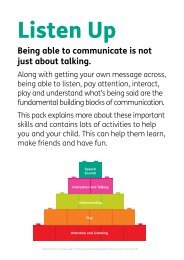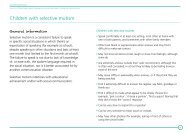Speech, language and communication needs: Evaluating outcomes ...
Speech, language and communication needs: Evaluating outcomes ...
Speech, language and communication needs: Evaluating outcomes ...
Create successful ePaper yourself
Turn your PDF publications into a flip-book with our unique Google optimized e-Paper software.
speech, <strong>language</strong> <strong>and</strong> <strong>communication</strong> <strong>needs</strong><br />
<strong>Evaluating</strong> <strong>outcomes</strong> tool<br />
d) What questions do you want<br />
to address?<br />
Typically, evaluations start with an overarching evaluation<br />
question or set of questions. These questions set out<br />
what the commissioner wants to know through the<br />
evaluation. These may relate to finding out about the<br />
commissioning process, the impact of a particular<br />
service, or whether certain groups of children <strong>and</strong> young<br />
people are being best served by a particular intervention.<br />
Questions can be categorised as:<br />
• Know why: Why have we commissioned our existing<br />
services? Why have certain interventions <strong>and</strong> services<br />
been implemented? Why do some interventions have<br />
more impact than others?<br />
• Know how: How do different interventions work,<br />
<strong>and</strong> what is the difference between a more or less<br />
successful intervention?<br />
• Know who: Who decided the range of services on<br />
offer? Who is involved in the delivery of services?<br />
Who uses the services? Who else is impacted beyond<br />
the service user?<br />
• Know what works: Which interventions are working<br />
or not, by area, across different schools, for different<br />
groups of children <strong>and</strong> young people <strong>and</strong> by specific<br />
diagnosis?<br />
• Know how much: What are the costs of different<br />
interventions <strong>and</strong> which services are more cost<br />
effective? Where should spending be focused to<br />
ensure best value for money?<br />
e) How do you want to collect<br />
the data?<br />
The processes described above, in particular mapping the<br />
service <strong>and</strong> identifying the research questions, will help<br />
shape the appropriate methodology for the evaluation.<br />
It is important to remember at this point that the scale<br />
of data collection will impact upon the scale of data<br />
analysis required at the next stage of the evaluation. The<br />
evaluation should be manageable at both ends – there<br />
is no point in having great data if there is too much to<br />
analyse!<br />
The following questions will help when making decisions<br />
about the form <strong>and</strong> extent of data required for the<br />
evaluation. They provide a balance between what is<br />
desirable <strong>and</strong> the practical limits of the evaluation.<br />
What are the sources of evidence to be<br />
collected?<br />
• Qualitative <strong>and</strong> quantitative mix of methodologies:<br />
Is the methodology data-led (such as the number of<br />
participants, attainment of young people in GCSEs,<br />
scores on <strong>language</strong> assessments) or perspective-led<br />
(i.e. thoughts of participants)? Is it a combination<br />
of both of these methodologies (qualitative <strong>and</strong><br />
quantitative)?<br />
• Who <strong>needs</strong> to be approached? Is it a lot of people<br />
in different roles or a specific group (for example,<br />
service users)?<br />
• How many people need to be approached? Is the<br />
relevant population a large or a small group? Does<br />
everyone need to be consulted or can it be a sample?<br />
• There are trade-offs between depth (the amount of<br />
detail you can gather) <strong>and</strong> breadth (the number of<br />
cases or respondents you can study). The best balance<br />
in any given situation depends on the aim of the<br />
evaluation, the time available <strong>and</strong> your budget.<br />
What are the logistics?<br />
• Time: What are your time limitations for data<br />
collection <strong>and</strong> analysis? What existing evidence is<br />
there – both project specific <strong>and</strong> universally available<br />
data sets such as school data – <strong>and</strong> what <strong>needs</strong> to be<br />
collected? If the evaluation is to consult people, how<br />
easy is it to contact them? Do you have sufficient<br />
time to undertake an in-depth analysis of all your<br />
collected data? For example, qualitative analysis is<br />
frequently time-consuming; have you made provision<br />
for this process?<br />
• Who will be involved: Who will be involved in<br />
collecting <strong>and</strong> analysing the data? Will you, a<br />
colleague, your stakeholders, or a contractor be<br />
undertaking this? What experience does the team<br />
have in managing evaluations <strong>and</strong> are there any skills<br />
that need bolstering?<br />
• Software: What software do you have that may help<br />
your analysis? Relevant software ranges from simple<br />
spreadsheets to web-based survey tools <strong>and</strong> more<br />
sophisticated statistical or textual analysis software.<br />
Do you need training in this software?<br />
• What is the budget: What are the costs of running<br />
the evaluation? Will participants give their time freely<br />
or will they need incentives? Will any element of the<br />
evaluation need to be outsourced?<br />
• Ethics: All evaluation has ethical implications but<br />
certain types need additional consideration. This<br />
particularly applies when working with children <strong>and</strong><br />
young people.<br />
These questions should provide some answers to both<br />
the type <strong>and</strong> depth of required data. There is a wealth<br />
of different data collection methodologies available for<br />
both qualitative <strong>and</strong> quantitative sources of evidence<br />
<strong>and</strong> which can be tailored to the specific dem<strong>and</strong>s of an<br />
evaluation. Each approach comes with its own strengths<br />
<strong>and</strong> weaknesses but, as long as these are taken into<br />
consideration, an evaluation can flexibly employ the most<br />
appropriate methodologies <strong>and</strong> extract the most relevant<br />
information.<br />
Commissioning Support Programme | 11


